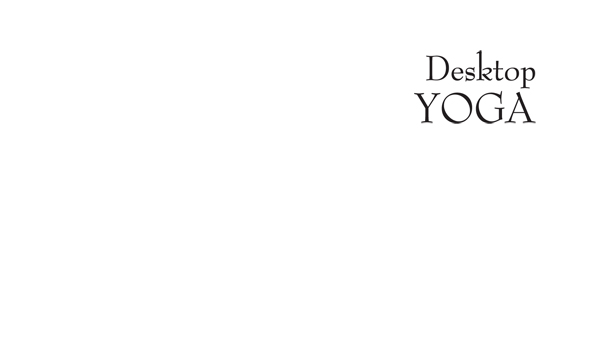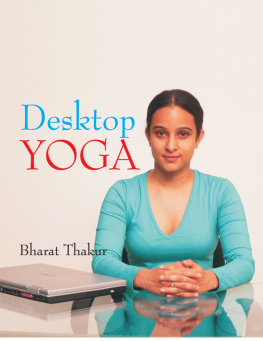Bharat Thakur - Desktop Yoga
Here you can read online Bharat Thakur - Desktop Yoga full text of the book (entire story) in english for free. Download pdf and epub, get meaning, cover and reviews about this ebook. year: 2011, publisher: Wisdom Tree Publishers, genre: Religion. Description of the work, (preface) as well as reviews are available. Best literature library LitArk.com created for fans of good reading and offers a wide selection of genres:
Romance novel
Science fiction
Adventure
Detective
Science
History
Home and family
Prose
Art
Politics
Computer
Non-fiction
Religion
Business
Children
Humor
Choose a favorite category and find really read worthwhile books. Enjoy immersion in the world of imagination, feel the emotions of the characters or learn something new for yourself, make an fascinating discovery.
- Book:Desktop Yoga
- Author:
- Publisher:Wisdom Tree Publishers
- Genre:
- Year:2011
- Rating:4 / 5
- Favourites:Add to favourites
- Your mark:
- 80
- 1
- 2
- 3
- 4
- 5
Desktop Yoga: summary, description and annotation
We offer to read an annotation, description, summary or preface (depends on what the author of the book "Desktop Yoga" wrote himself). If you haven't found the necessary information about the book — write in the comments, we will try to find it.
For most of us, our desk is like a second home. In fact, we probably spend more time glued to our desks than at home. This often results in severe backache, frozen shoulder, difficulty in walking and body pain. All this affects the quality of life and work, yet we dont do anything about it and keep putting it off. Desktop Yoga solves your dilemma in a flash because it gives you simple and effective yoga exercises that you can do at your desk itself.
Desktop Yoga — read online for free the complete book (whole text) full work
Below is the text of the book, divided by pages. System saving the place of the last page read, allows you to conveniently read the book "Desktop Yoga" online for free, without having to search again every time where you left off. Put a bookmark, and you can go to the page where you finished reading at any time.
Font size:
Interval:
Bookmark:


Copyright Bharat Thakur
First published 2007
ISBN 81-8328-059-5
All rights reserved. No part of this book may be reproduced, stored in a retrieval system or transmitted in any form or by any means electronic, mechanical, photocopying, recording or otherwise without the prior permission of the publishers. While every precaution has been taken in the preparation of this book, the publisher and the author assume no responsibility for errors or omissions. Neither is any liability assumed for damages, if any, resulting from the use of information contained herein.
Published by
Wisdom Tree
4779/23, Ansari Road
Darya Ganj, New Delhi-110002
Ph.: 23247966/67/78
Published by Shobit Arya for Wisdom Tree; edited by Manju Gupta; designed by Kamal P. Jammual; typeset at Marks & Strokes, New Delhi-110002 and printed at Print Perfect, New Delhi-110064
Contents
Introduction
T he idea of writing a book on desktop yoga came to me when I visited a large corporate house. It was lunchtime and it was a funny sight to see a person bending his neck right and left, another rotating his shoulders, some others bending forward and backward while a few massaging each others shoulders! I felt sorry for them as these are the people who form the backbone of the economy of my nation.
My research on people working in offices gave me some very strange results. For example, people who sit in front of switched-on desktops get so hypnotised that they unknowingly work longer than their required hours. Most accidents on the road happen at night because of the white line drawn on the road. The flashing headlights of an approaching vehicle illuminate it even more and people driving at night, watch the white beam of paint on the road. After driving for some hours, they get so hypnotised by it that when there is a break in that white line, they forget to turn and instead hit the divider on the road.
This is simply to explain to all those people working on computers that, unknowingly, they get hypnotised by the light coming from the screen and, in that state of hypnosis, they tend to forget all about their body posture. So they take a comfortable position which includes a slouched back, legs spread apart and head tilted downward. If what Im saying stands true for you computer users, then you all are likely to suffer from at least problems affecting one of the following:
- stomach;
- lumbar back;
- middle back;
- cervical area;
- shoulder.
Most computer-tables have cabinets below the desktop, leaving no space for the legs. The result is that your legs may develop veinous problems and sciatic pain along the sides. Watching the screen for hours on end, your eyesight is bound to weaken and affect your brain and blood circulation. The chances of migraine occurring are also very high. A frozen shoulder could also be a gift from your desktop. Problems like these are bound to arise even if you have the most advanced sitting arrangements the right height for the computer, right posture for your body, correct seating, etc. These will simply decrease your problems but will not remove them.
So this book is not about the right seating arrangements nor about the correct posture for sitting at a computer, etc. It is intended for people who dare to break their habits and accept that productivity is not about working long hours but working with the right frame of mind. Being computer professionals, your other nickname is creativity. You have to create new stuff all the time and, to be truly creative, you have to get rid of that state of hypnosis you find yourself in when sitting in front of the computer screen.
So, those people who dare to pick up this book, must read it well as it affects the rest of your life. You will be free from all kinds of problems, diseases and aches and pains.
Man: The New Machine
C omputers, computers... machines, machines... have taken over mans life today. The twenty-first century has seen a revolution with machines ruling our life. Man is now slowly and gradually functioning like a machine. Machines have no emotions. Machines have no feelings. They know no fear and have no head of their own. Machines dont have understanding. Machines are programmed to start work when a button is pressed.
Human beings ruled by machines end up becoming machines themselves. When working with human beings, if you look tired, others, even if they hate you, will tell you, "You are looking tired, my friend. Go, and rest." Machines dont say this. Machines will do the opposite and say, "Dont you see, Im never tired? How can you leave me and go without finishing the job?"
Man made the machines in order to live happily, to live life easily, to bring speed to life. The day the wheel was invented was the day when man started moving towards machines. He started growing faster and moving faster but, in this process, he forgot what his fast movement was intended for to make life easier! And, with the birth of the computer, man became so impressed by speed that he forgot all other dimensions of his being, namely emotions, love and feelings.
No one is ready to pause. They pause only when they end up in the hospital. If the Information Technology (IT) revolution in the world continues at the same pace as it has done so far, the day is not far when we will see many more heads lolling in the madhouse. No doubt the IT revolution has improved life to a considerable extent for those who stay away from computers, but then there are others who work day in and day out to create software for solving millions of questions in a difficult project and this becomes their way of life. They create easy lifestyles for others by killing themselves.
I call IT professionals monks who live for the sake of others. I have great respect for them as they have improved human living standards enormously but, with the compressed disc of their own lives, they have decreased their own height. Monks work to bring happiness to other people by freeing them from the basic bugs of life but IT professionals are simultaneously making people totally dependent on machines so as to make their lives more comfortable.
My father never used a computer. He loved to write letters by hand and send them by post. He never used e-mail. I once told him; "By e-mail, your letter will reach right now, within a fraction of a second."
He replied with some very beautiful lines: "Within seconds, emotions dont get any space. An emotion is to be expressed, lived, experienced and then reacted to. If you continue with your e-mails, you will get frustrated when sharing your emotions as there is no pause or rest in between."
Well, as I said earlier, the IT world is merely a child now. But if you visualise the world about twenty years hence, you will find that the more and more you decrease the gaps in life to insert pace and speed into them, the more you will lose touch with your emotions. Towards that end, Ive heard that people have started putting chips inside their bodies so that there is no need to insert cards to open the security locks of doors! This is just the beginning. Tomorrow, human beings will not be able to live because these chips may develop viruses.
So, the fight will begin. Who will have the most powerful chip? There are researchers working on programmes for inserting a chip in the brain to understand what people think. You wont be able to live if you know everything about a person who stands in front of you because you will judge him instantly. Love will disappear from the world; only intelligence will grow and man will become a robot. Are we heading towards that mechanical world? We have ruined Nature by building dams, by felling trees, by manufacturing medicines out of plants, by creating more unnatural stuff. The day is not far when man will kill Gods ultimate creation the man by making him a robot. Heed my warning, all you super intellectual IT professionals!
Font size:
Interval:
Bookmark:
Similar books «Desktop Yoga»
Look at similar books to Desktop Yoga. We have selected literature similar in name and meaning in the hope of providing readers with more options to find new, interesting, not yet read works.
Discussion, reviews of the book Desktop Yoga and just readers' own opinions. Leave your comments, write what you think about the work, its meaning or the main characters. Specify what exactly you liked and what you didn't like, and why you think so.











